Unit 2 Lingling is better than Daming
Linging_is_better_than_daming 自制
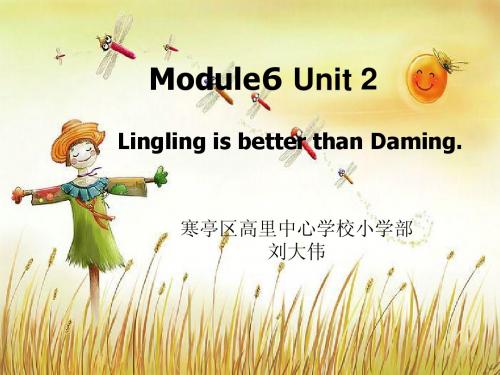
Practice in group
Practice in group, make sentences with “I can …, … can … too. But I am better than ….”
Sports housework hobbies(爱好) musical instruments(乐器)
Chinese • Lingling and Daming like _______ music _____. • They can play the______and _____. erhu zither pop music • Sam and Amy like __________. guitar • They can play the ______and _____. drums
They can play the _____. zither worse Lingling is________than Daming
• They can play the _____. guitar • Amy is______than worse Sam.
They can play the _____. drums better Amy is______than Sam.
Chinese music
中国音乐
erhu
zither
pop music
流行音乐
guitar
drum
我做动作你来猜
play the erhu/zither/guitar/drums
你做动作我来猜
play the erhu/zither/guitar/drums
pop music erhu
Homework
小组合作学习调查自己小组喜好的乐器。
Unit 2 - 副本

Work in pairs. Ask and answer the questions. 1. Which monitor would you like to be for your class? Class monitor PE monitor Cleaning monitor 2. What do these monitors do?
[链接]
be good for 表示“能……有好处(益处)”, 反义短语是“ be bad for (对……有害处)”。 如: Running is good for your health. 跑步对你身体有好处。 Watching TV too much is bad for your eyes. 电视看得太多对你的眼睛有害。
[辨析]
get ready for / to do和be ready to do的区别 get ready to do sth. 和 be ready to do sth. 的意思是“准备做某事”。前者强调行 为;后者强调状态。两者后面可接介词 for,for后面接名词。如: We are ready for the English test. We got ready for the dictation.
[辨析] get along with sb.“与某人相处”,结果可 能是相处得好也可能是相处得不好;如果要 表示“与……相处融洽”则要用get along well with。 How are you getting along with your new girlfriend? 你和新女朋友相处得如何? I get along pretty well with most of them. 我和他们大部分人的都相处得不错。
the PE monitor.
2021-2022学年-有答案秋英语(Go_for_it)七上Unit_2(重庆)综合训练题

2021-2022秋英语(Go for it)七上Unit 2(重庆)综合训练题一、单选题1. --- Are ________your keys?--- Yes, they are. They're ________.A.this; myB.that; mineC.these; myD.those; mine2. Bob, can you see the boys over there?________are my cousins. Let's go and say hello to them.A.ThisB.ThoseC.ThatD.These3. --- ________ is that tall boy? --- He's my classmate.A.WhatB.WhereC.WhoseD.Who4. — Cathy, ________ is my sister, Linda. — Hi, Linda!A.thisB.thatC.theseD.those5. The daughter of Sam’s uncle is his ________.A.auntB.cousinC.sisterD.brother6. ---What are________ teachers doing?---They are having a meeting.A.thisB.thatC.thoseD.they7. ________ are his brothers, Peter and Dave.A.ThisB.HeC.ThoseD.That8. --________ is he?--He is PSY. He sang the song Gangnam Style (《江南Style》).A.WhoB.HowC.WhatD.Where9. --- ________ is the girl behind you? --- She's my elder sister.A.WhatB.How muchC.WhereD.Who10. --- How much are these trousers? --- ________ 65 yuan.A.It isB.They areC.This isD.These are11. You can see my grandparents in the ________.A.keyB.numberC.penD.picture12. ________ dogs are white. ________ are my dogs.A.This; TheyB.Those; TheyC.That; ThoseD.They; Those13. I am Tim’s mother. He is my ________.A.brotherB.sonC.uncleD.cousin14. — Mom, those are my friends, Paul and his sister Anna.— ________A.Bye!B.Good morning!C.Good luck!D.Nice to meet you!15. — Have a good day, Jim!— ________A.I’m fine.B.I am Tim.C.Thanks.D.Oh, I see.二、根据首字母填空三、单词拼写(根据中文提示拼写单词).(1)I have three ________(照片) about my school.(2)Is Tom's ________(弟弟) happy today?(3)These ________(女孩) are Mr. Smith's daughters.(4)The black backpack on the sofa is my ________(妹妹的).(5)Who's in the ________(下一个) photo?(6)Thanks for the photo of your ________(堂兄).(7)Mr. Wang wants to have a ________(儿子).(8)I go to see my ________(父母亲) once a month.(9)Her ________(阿姨) lives in Shanghai.(10)Alice is Mr. Green's ________(女儿).三、完型填空四、完形填空。
小学四年级英语教案精选11篇

小学四年级英语教案精选11篇课时探究活动篇一探究内容:让学生制作出属于自己的作息时间表探究目的`:了解学生掌握前三单元单词掌握情况及学生综合运用语言的能力活动方式:自己动手活动过程:(1)教师出示一张加拿大一名小学四年级学生的作息时间表9:00Class meetingReadingWriting10:15-10:3010:30-12:2012:00-1:00Recess—outdoor activitiesMathLunch1:00-2:152:15-2:302:30-3:303:306:30Science/Social study/FrenchRecess-outdoor activitiesArt or GymGo homeSupper7:30-9:00HomeworkWatch TVMovies9:30Go to bed(2)让学生与自己的作息时间相比较,在小组内展开讨论。
(3)学生自己动手制作一张属于自己的时间表小学四年级英语教案篇二一、教学内容Unit 1 Blouses and Jeans二、教学目标1. Work with language, sing along and fun with English.2. Vocabulary: hundred, jacket, socks, coat, sport shoes, sweater…..3. Sentence structure: NUM and MUM is NUM. How much is are……?三、教学重点能听懂并认读有关衣物的英语名称,能看图用简单的英语来描述衣物。
四、教学难点能正确流利理解、朗读甚至背诵对话:能较好地掌握本节课的内容。
五、教具、学具tape, pictures六、教学过程OrganizationTo greet each other and then sing an English song: Good morning/ Good afternoon.Revision1. Review the picture of clothes in oral:What’s it? It’s a ……What’re they? They’re ……2. Review the Dialogue A.Look at the picture and say:3. Point out the project of this lesson.Presentation and exercises1. New words: hundred, jacket, socks, coat, sport shoes, sweater……2.Work with language:1) Practice orally, and than complete the dialogue.2) Make new dialogues in pairs, and ask some pairs act out in class.3) Listen to the tape and write down the prices.3.Chant:I like birds, I like shirts. I like the skirt but it’s hers.4.Fun with language:1) Listen and learn the song in P4.2) Listen and color the clothes. (This can be done after school as homework if time is limited)Pro-taskSummary四年级英语教案篇三教学目标1、知识目标:能够听、说、认读国家词汇:classroom,window,door,picture,blackboard,light2、能力目标:能在实际情景中运用句子What'sintheclassroom?Oneblackboard,oneTV,manydesksandchairs、3、情感目标:通过学习教室内物品,,心怀感恩,乐于评价室内环境。
新标准三起四下课课小考卷

Module 1 Unit 1 She is a nice teacher. Name:1. ( ) This is Lily. She is ___ bit shy. A: an B: a C: the2. ( ) This ___ my English teacher. A: is B: am C: are3. ( ) These___ my friends. A: am B: is C: are4. ( ) Tom is a naughty___. A: boy B: girl C: birds5. ( ) Is she cute? No, ___. A: she is B: I’m not C: she isn’t6. 翻译下列短语a bit shy a nice teacher a clever pupila naughty bird my friend7. 选择正确的答语( ) Are these your friends? A: No, they aren’t.( ) Are you shy? B: Yes, she is.( ) Is she a nice teacher? C: Yes, I am.( ) Is he very clever? D: No, he isn’t.( ) Is Parrot a very naughty bird? E: Yes, it is.Module 1 Unit 2 He’s cool. Name:1.This is Lucy. She is a bit____(害羞的).2.Look, this is my brother. He is very ___(酷的).3.Ann is a ___(好的,友善的) girl.4.Sweet is my friend. It’s a ___(小鸟).5.This is my dog. It’s very ___(可爱的).6.Look , little, sister, at, Lucy’s .(连词成句并翻译)7. you, Are , naughty, ?(连词成句并翻译,注意标点符号)Module 2 Unit 1 London is the capital of England. Name:1.翻译句子。
外研社版三起英语四年级下册教材分析

外研社新标准英语三起四年级下册教材分析教学内容:全书共分十一个模块,内含一个期末复习模块。
Module1 FriendsModule2 LondonModule3 PicnicModule4 RobotsModule5 SizeModule6 MusicModule7 CountriesModule8 ChangesModule9 WeekendModule10 AccidentsReview Module教材分析:本册教材是供小学四年级下学期使用的。
全书共分11个模块,内含一个期末复习模块。
每一个模块分为两个单元。
一般情况下,第一单元呈现本模块所要学习的语言内容,第二单元提供若干任务型练习,包括一首歌或小诗。
歌谣或小诗的学习,目的有三:一是培养学生的语感和节奏感;二是提高发音的正确性;三是通过这些英语国家儿童所熟知的歌谣,介绍一定的西方文化。
其中的一些不常用的单词,不要求学生在歌谣之外学会使用。
在本册中,我们将学习星期的表达方法,谈论有关郊游的情况,初步了解有关伦敦和美国的基础知识;我们将进一步学习如何表达能力,如何谈论将来发生的事情;我们还将学习如何描述过去的动作与状态,特别是如何在讲故事的进修讲述过去的动作与状态。
教学目的:一、培养学生的语感和节奏感。
二、提高发音的正确性。
三、通过这些英语国家儿童所熟知的歌谣,介绍一定的西方文化。
教学措施:一、确定恰当的教学目标。
二、创造良好的学习气氛。
三、在课堂上尽量使用英语,适当使用汉语。
四、鼓励、帮助学生,恰当纠正错误。
五、利用多媒体教学。
各单元教学目标解析:Module1Friends(朋友)题材内容熊猫Panpan向大家一一介绍他的家人、朋友还有老师。
他们性格特征不一,有的友善,有的调皮,有的聪明,也有的害羞……教学目标语言知识目标句子:1、This is Ms Smart.2、She’s a nice teacher.3、He’s very nice.词汇:听能在句子中听懂单词:nice, shy, naughty, clever, cool, cute, good, bad, friendly, little, a bit, very说能够看图或指着实物或人物说出单词:nice, shy, naughty, clever, cool, cute, little, a bit, very读能在图片或实物的提示下,认读单词:nice, shy, clever, cool, cute, little, a bit, very写会写单词:nice, shy, cool, cute情感态度1、对待他人应该客观、公正、友善;5、养成良好的行为习惯和学习习惯;Module 2London(伦敦)题材内容Amy和Lingling在一起看一本有关英国首都伦敦的画册。
一般现在时1
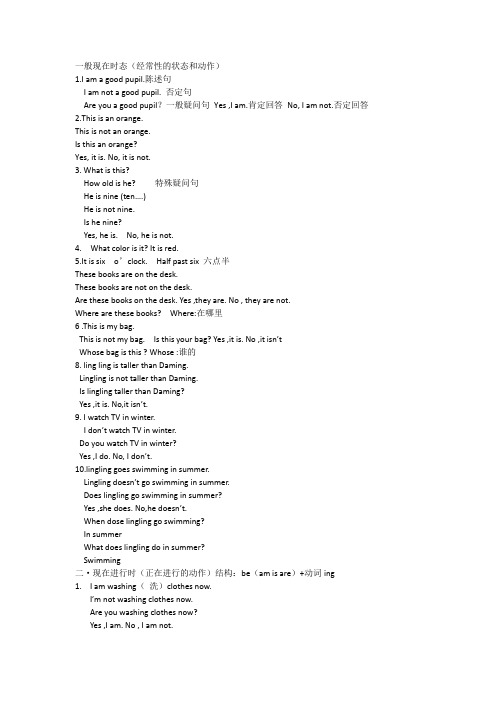
一般现在时态(经常性的状态和动作)1.I am a good pupil.陈述句I am not a good pupil. 否定句Are you a good pupil?一般疑问句Yes ,I am.肯定回答No, I am not.否定回答2.This is an orange.This is not an orange.Is this an orange?Yes, it is. No, it is not.3. What is this?How old is he? 特殊疑问句He is nine (ten….)He is not nine.Is he nine?Yes, he is. No, he is not.4. What color is it? It is red.5.It is six o’clock. Half past six 六点半These books are on the desk.These books are not on the desk.Are these books on the desk. Yes ,they are. No , they are not.Where are these books? Where:在哪里6 .This is my bag.This is not my bag. Is this your bag? Yes ,it is. No ,it isn’tWhose bag is this ? Whose :谁的8. ling ling is taller than Daming.Lingling is not taller than Daming.Is lingling taller than Daming?Yes ,it is. No,it isn’t.9. I watch TV in winter.I don’t watch TV in winter.Do you watch TV in winter?Yes ,I do. No, I don’t.10.lingling goes swimming in summer.Lingling doesn’t go swimming in summer.Does lingling go swimming in summer?Yes ,she does. No,he doesn’t.When dose lingling go swimming?In summerWhat does lingling do in summer?Swimming二·现在进行时(正在进行的动作)结构:be(am is are)+动词ing1.I am washing(洗)clothes now.I’m not washing clothes now.Are you washing clothes now?Yes ,I am. No , I am not.What are you doing now?2.He is playing football now.He isn’t playing football now.Is he is playing football now?Yes he is. No ,he isn’t.3.The cat is eating fish now.The cat isn’t eating fish now.Yes it is. No it isn’t.4.They are riding bikes now.They aren’t riding bikes now.Are they are riding bikes now?Yes they are. No they aren’t.What are they doing?5.My father is swimming.My father isn’t swimming.Is your father swimming?Yes he is. No he isn’t.-Who is swimming? -My father.三·将来时态(将来要存在的或发生的时态)1)结构:be(am is are)+going to+动词原行打算1.I’m going to take pictures tomorrow.I’m not going to take pictures tomorrow.Are you going to take pictures tomorrow?Yes I am . No I’m not.What are you going to do tomorrow?2.Daming is going to play table tennis on Sunday.Daming isn’t going to play table tennis on Sunday.3.Is Daming going to play table tennis on Sunday.Yes he is. No he isn’t.When is Daming going to play table tennis?(对on Sunday提问) 2)结构:will+动词原形1. I’ll listen to music tomorrow.I will not (won’t) listen to music tomorrow.Will you listen to music tomorrow?Yes I will. No I won’t.What will you do tomorrow?2.Robots will cook noodles.Will Robots cook noodles tomorrow?Yes,they will. No,they won’t.3. It will be windy in Beijing.Will it be windy in Beijing?四·一般过去时(过去存在的状态或发生的动作)1.I was a driver ago.I was n’t a driver ago.Were you a driver ago.Yes , I was. No I wasn’t.2. Amy was taller than Sam.Amy wasn’t taller than Sam.Was Amy taller than Sam?Yes, she was. No, she wasn’t3 .Amy and Sam were older than maomao.Were Amy and Sam older than maomao.Yes ,they were. No, they weren’t.4 .We lived in a small house ago.We didn’t live in a small house ago.Did you live in a small house ago?Yes, we did. No,we didn’t.When did you live in a small house?Where did you live ago?5.He bought a ball yesterday.He didn’t buy a ball yesterday.Did he buy a ball yesterday?Yes, he did. No,he didn’t.五·存在性的有there be 的用法1. There is an agg in the box.There isn’t an agg in the box.Is there an agg in the box?Yes,there is. No there isn’t..2. There are some apples thereThere aren’t any apples there.Are there any apples there?Yes, there are. No there aren’t.3. There was a TV in my room ago.There wasn’t a TV in my room ago.Was there was a TV in your room ago?Yes, there she was. No, there wasn’t4. There were three teachers ago.There weren’t three teachers ago.Were there three teachers ago?How many teachers were there?5. There is some milk in the box.How much milk is there in box?六·情态动词can的用法can+动词原型1.I can do my homework.I can’t do my homework.Can you do your homework?Yes, I can. No, I can’t.2. Mum and Amy can write letters.Can Mum and Amy write letters.Yes , they can. No, they can’t.What Can Mum and Amy do?Robots can talk to(与···谈话交谈)people(人们)Robots can’t talk to people.Can robots talk to people?Yes,they can. No,they can’t.几个特殊疑问句1.what什么2.where 在哪里3.who谁4.whose谁的5.How怎么样6.why为什么7. How many多少用于可数名词8.what time什么时候9.when什么时候10.How much(多少钱)多少(用于不可数名词)11.How old多大12.Howlong多长时间不规则动词过去式汉语动词原形过去式1.跌落fall off fell off2.去go went3.购买buy bought4.吃患have had(has)5运送carry carried6遇见meet met7.跑run ran8.丢失lose lost9.响,鸣ring rang10.掉drop dropped11.学习learn(study)learned(studied)12.给give gave13.喝drink drank14.骑ride rode15.穿wear wore16.告诉,讲tell told17.制作make mode18.做,干do did19.是is,am(are) was(were)20.看见see saw21.教teach taught22.拿,带,照take took23.得get got24.写write wrote动词短语1.go to school 去上学2.get up 起床3.go to bed 上床睡觉4.watch TV 看电视5.6.go home 回家7.have breakfast 吃早餐8.have lunch 吃午餐9.have dinner 吃晚餐10.go to work 去上班11.go straight on 直着走12.take pictures 照相13.talk to 交谈14.play with 玩,摆弄15.listen to music 听音乐16.get on 上(车)17.turn on 打开e in 请进19.sit down 坐下20.stand up 起立21.go swimming 游泳22.do one’s homework 做作业23.read a book 读书24.walk to work(school) 步行去上班(上学)25.have a stomachache 胃痛26.have a cold 感冒27.have a headache 头疼28.have a fever 发烧29.do mooring exercises 做早操30.look at 看31.fly kites 放风筝32.go fishing 钓鱼33.How are you? 你好吗?34.Here is your present. 给你的礼物35.I’m ten. (I’m ten years old) 我十岁36.Happy birthday. 生日快乐37.Happy birthday to you. 祝你生日快乐38.Happy Spring Festival 春节快乐39.Happy(merry ) Christmas 圣诞快乐40.Christmas tree 圣诞树七.所属性的有:have got拥有的用法Has got拥有(用于第三人称单数)1.I have got a now book.I haven’t got a now book.Have you got a now book?Yes,I have. No,I haven’t.What have you got?2.He(she) has got a red bag.He hasn’t got a red bag.Has he got a red bag?Yes,he has. No,he hasn’t.3.Lingling and Daming have bikes.Lingling and Daming haven’t bikes.Have Lingling and Daming bikes?Yes,they have. No,they haven’t.一缩写形式1.He is=He’s2.I am=I’m3.She is=She’s4.It is=It’s5.You are=You’re6.We are=We’re7.They are=They’re8.Is not=Isn’t9.Are not=Aren’t10.Do not=don’t11.Does not=doesn’t12.Can not=can’t13.I have got拥有=I’ve got14.He has got拥有=he’s got15.I will=I’ll16.Will not=won’t17.Was not=wasn’t18.Were not=weren’t19.Did not=didn’t二.人称代词汉语主格宾格形容词性的物主代词名词性的物主代词1.我I me my mine2.你you you your yours3.他he him his his4.她she her her hers5.我们we us our ours6.你们you you your yours7.他们they them their theirs8.它it its its its四.形容词变比较级1.高的tall-----taller2.矮的short-----shorter3.大的big-----bigger3.小的small----smaller4.胖的fat----fatter5.瘦的thin----thinner6.年轻的young----younger7.年老的old----older8.新的new----newer9.旧的old----older10.重的heavy-----heavyer11.轻的light----lighter12.容易的easy----easyer13.困难的hard----harder14.好的good----better15.差的bad-----worse16.强壮的strong----stornager17.长的long----longer18.短的short-----shorter。
小学英语阅读课的教学设计

小学英语阅读课的教学设计几年前开始,小学英语的语篇教学已经成为非常重要的,讨论非常多的话题。
小学三、四年级可以看做发展英语阅读能力的准备阶段,多涉与词和句的认读阶段;到了五、六年级,小学英语教材中出现了显性的阅读语篇,怎样施教阅读课也开始为教师所关注。
而现大多数教师比较普遍的授课思路是:把阅读语篇看作教学口语或听力的素材,教师逐词逐句地解释和分析;反复放录音,直到学生能正确发音、熟练朗读并能完成课本上的阅读检测任务。
针对阅读教学中出现的这些问题,下面对小学高年级英语阅读教学发表一下我自己的观点。
首先,我们要对语篇教学的认识有一个初步的定位,教材的设计意图巩固拓展本单元的语法,不涉与新的语法知识。
阅读的目的是让学生理解阅读内容,培养学生的阅读能力。
例如,PEP教材六年级下册Unit1 PartB部分的Read and write。
这一部分的教学目标就是巩固拓展本单元的重点语法‘比较级’。
阅读课的教学步骤一般来讲,阅读理解要经历的心理过程是一个自下而上的过程和自上而下的过程。
前者针对词句的理解,后者则更多地运用了背景知识与推论等阅读技能。
因此,对语言能力低的读者而言,阅读与其说是一个阅读问题,到不如说是一个语言问题。
从这个意义上来讲,在小学高年级的英语阅读中,可按照“阅读前---阅读中---阅读后”的三步教学模式,即阅读前通过浏览预测语篇内容,而后从略读到精读多次阅读,不断确认或修订预测,直到理解所读语篇。
其中阅读中和阅读后两部分在实际操作中经常柔和在一起,呈现出“阅读---检测---再阅读---再检测”的过程。
在这个过程中教师可安排适当形式和难度的活动,即阅读前判断学生对语篇语言(词汇、语法)的理解情况,利用导读活动激活其原有的知识储备,解决其最主要的语言困难;阅读中着重培养学生正确的阅读行为和习惯,引导学生使用基本的阅读技巧,如运用背景知识,尝试联想、推论等;阅读后检测部分着眼于巩固、拓展相关语言知识,并促进与其他语言技能的融合。
外研社版小学英语教材

第一册三年级上册Module 1Unit 1 I'm SamUnit 2 How are you? Module 2Unit 1 I ’m Ms Smart Unit 2 What's your name? Module 3unit1 Point to the door unit2 Point to the desk Module 4Unit 1 It's red.Unit 2 It's a black dog Module 5Unit 1 How many?Unit 2 Nine girlsModule 6Unit 1 This is my school Unit 2 What's this? Module 7Unit 1 Happy birthday! Unit 2 How old are you? Module 8Unit 1 Is it a dragon?Unit 2 Where's the cat? Module 9Unit 1 This is my mother. Unit 2 He's a doctor. Module 10Unit 1 This is his head. Unit 2 Point to her nose 第二册三年级下册Module 1Unit 1 It's the ABC Song.Unit 2 My favourite toy is a car.Module 2Unit 1 They're monkeys.Unit 2 That monkey is fatModule 3Unit 1 I like football.Unit 2 I don't like riding bikes.Module 4Unit 1 Do you like meat?Unit 2 Does Daming like bananasModule 5Unit 1 I get up at seven o'clock.Unit 2 What's the time, please?Module 6Unit 1 What do you do at the weekend? Unit 2 What does she do at the weekend?. Module 7Unit 1 We have a big family dinnerUnit 2 We have Christmas in England. Module 8Unit 1 It's hot in summer.Unit 2 It's hot and sunny today.Module 9Unit 1 I've got a new book.Unit 2 She goes to school by bike. Module 10Unit 1 It's on your desk.Unit 2 Daming flies kites in the park.第三册四年级上册Module1U1seventeen,eighteen,nineteen,twenty Unit2 I've got twenty-six points. Module2Unit1 Where are you going?Unit2 The train is going up the hill. Module3Unit1 She's watching TV.Unit2 What are you doing?Module4Unit1 What are they doing?Unit2 What is Amy doing?Module5Unit1 Do you want some rice?Unit2 I'm making dumplings.Module6Unit1 Can you run fast?Unit2 Yes,I can.Module7Unit1 We're going to go to Hainan. Unit2 We're going to visit the Ming Tombs.Module8Unit1 What are you going to do?Unit2 I'm going to do the high jump. Module9Unit1 Can I have some sweets?Unit2 Happy Halloween!Module10Unit1 There is one birthday in May. Unit2 There are twelve months in the year. 第四册四年级下册Module 1Unit 1 She's a nice teacher.Unit 2 He's cool.Module 2unit 1 London is the capital of England. unit 2 This is the River Thames. Module 3unit 1 Will you take your kite?unit 2 On Monday I'll go swimming. Module 4unit 1 Robots will do everything.unit 2 Will it be windy in Beijing? Module 5unit 1 Amy's taller than Lingling.unit 2 Beijing is bigger than Tianjin. Module 6unit 1 This girl is good.unit 2 Lingling is better than Daming Module 7unit 1 New York is in the east.unit 2 Beijing is the capital of China.Module 8unit 1 I was two.unit 2 They were young.Module 9unit 1 I helped Mum.unit 2 Did dad cook lunch?Module 10unit 1 Sam fell off his bike.unit 2 Sam had lots of chocolate biscuits.第五册五年级上册Module 1 Unit 1 When did you come back?Unit 2 Did they buy ice creams?Module 2 Shopping Unit 1 How many do you want?Unit 2 How much milk do you want?Module 3 Unit 1 We visited lots of Unit 2 What did Daming do?Module 4 Unit 1 It's mine!Unit 2 This bag is hers.Module 5 Unit 1There are enough.Unit 2 There are too many books onModule 6 Self-assessment Unit 1 You can play football Unit 2 I can do it very well. Module 7 Community Unit 1 He can't see.Unit 2 They can't walk.Module 8 School Unit 1 What time does school start?Unit 2 Where did Lingling goModule 9 Feelings Unit 1 Are you feeling sad?Unit 2 I feel happy.Module 10 Manners Unit 1 You should look, then cross Unit 2 You should eat fruit.第六册五年级下册Module 1 Unit 1 We lived in a small house.Unit 2 She didn't have a television.Module 2 Unit 1 She learnt English.Unit 2 Mr Li was a teacher.Module 3 Unit 1 She had eggs and sausages.Unit 2 Sam ate six hamburgers.Module 4 Unit 1 Where are the books about computers,Unit 2 Where can you find out about animals?Module 5 Unit 1 It's big and light.Unit 2 It's too big for you.Module 6 Unit 1 I went there last year.Unit 2 It's in the north of ChinaModule 7 Unit 1 Let's send an email.Unit 2 I will be home at seven o'clock.Module 8 Unit 1 What do you suggest?Unit 2 Line A is longerModule 9 Unit 1 We laughed a lot.Unit 2 See you soon.Module 10 Unit 1 Where are you going to go?Unit 2 I'm in New York now.第七册六年级上册Module 1 Unit 1 The Great WallUnit 2 New York is in the east of America.Module 2 Unit 1 Chinatown in America Unit 2 Postcards from ChinaModule 3 Unit 1 Collecting stamps is my hobbyUnit 2 I've got a hobbyModule 4 Unit 1 Happy Thanksgiving!Unit 2 What's your favourite festival?Module 5 Unit 1 Pleased to meet you!Unit 2 Pen FriendsModule 6 Unit 1 A Postcard from New YorkUnit 2 I’ve got some stamps from China . Module 7 Unit 1 I don't believe it!Unit 2 Pandas love bamboo.Module 8 Unit 1 looking at photosUnit 2 I often go swimmingModule 9 Unit 1 A Visit to the UNUnit 2 Do you want to go to Guilin?Module 10 Unit 1 At the LibraryUnit 2 Go straight on!第八册六年级下册Module1 Unit1 I want a hot dog, please.Unit2 What do you want to do?Module2 Unit1 We're going to have a picnicUnit2 It's going to snow in Harbin.Module3 Unit1 The sun is shinningUnit2 I am looking out of the windowModule4 Unit1 I'm making Daming's birthday card.Unit2 The apples are falling down the stairsModule5 Unit2 Unit1 Daming is having a birthday partyUnit2 He's riding his bike,but it's starting toModule6 Unit1 I bought you this bookUnit2 What's it about?Module7 Unit1 ShenZhou V flew into spaceUnit2 He spent about twenty-one hours inModule8 Unit1 Helen KellerUnit2 His name was Louis BrailleModule9 Unit1 What's the matter?Unit2 Because it's going to rainModule10 Unit1 We are going to speak ChineseUnit2 What are you going to study?。
外研版(三起点)四年级上册Module2 Unit 2

Ha ha…
Let’s act out.
-What are you doing? -I’m listening to music! 这是现在进行时的特殊疑问句及回答,询问他人正在做什么。
listening to music
reading a book
…
Lily
√
…
风筝的起源 风筝起源于中国,最早的风筝由古代哲学家墨翟 制造的。据《韩非子·外储说》载:墨翟居鲁山(今 山东青州一带)“斫木为鹞,三年而成飞一日而败”。 是说墨子研究了三年,终于用木头制成了一只木鸟, 但只飞了一天就坏了。墨子制造的这只“木鹞”就是 中国最早的风筝。 风筝最初常被利用为军事工具,用于传递信息、
现在进行时常用句型。
现在进行时的一般疑问句。 句型结构:Be(+not) + 主语 + 现在分词 + 其他? 例 Are they playing football?
Aren’t they playing football?
Practise.
开火车
一列同学前一个问,后一个答,答者接着问下
一个同学。进行What are you doing? I’m….问答练 习。看看哪列同学速度最快,说得最标准。
外研版·英语·四年级上册
Module 2 Unit 2 What are you doing?
第一课时
第二课时
第一课时
句子接龙
五人一组,进行句子接龙。速度最快,说的最准确的为获胜组。 E.g. S1:I’m reading a book. S2: She’s reading a book. I’m running. S3: She’s reading a book. He’s running. I’m swimming. ……
Unit 2 I’m Wang Lingling and I’m thirteen years old

Name: Yao Ming Age: 33 Birth place: Shanghai Hobby: Basketball Job: Basketball player 1980年生于上海。 NBA及世界巨星。篮 球史上里程碑式人物。曾效力于中国国家篮 球队, NBA火箭队。2011年7月20日退役。被 美国《时代》列入“世界最具影响力100人”。
Look at the pictures and write sentences.
Tom, England, English, fourteen, Class 3 1. His name is Tom. 2. He’s from England. 3. He’s English. 4. He’s fourteen years old. 5. He’s in Class 3.
Hello, I’m Wang Lingling and I’m thirteenyears old. Good to see you. Wang Hui is my friend, but he is not in my class. His English name is Henry. He’s from Shanghai. Shanghai is a very big city.
Now correct the false sentences.
1. Henry is Daming’s English name. David is Daming’s English name.
2. Lingling’s English name is Linda. Lingling’s English name is Lucy.
4. Tony is my first name and Smith is my last name. 托尼是我的名, 史密斯是我的姓。 family name 姓 = last name 教名
手阅读教案7篇
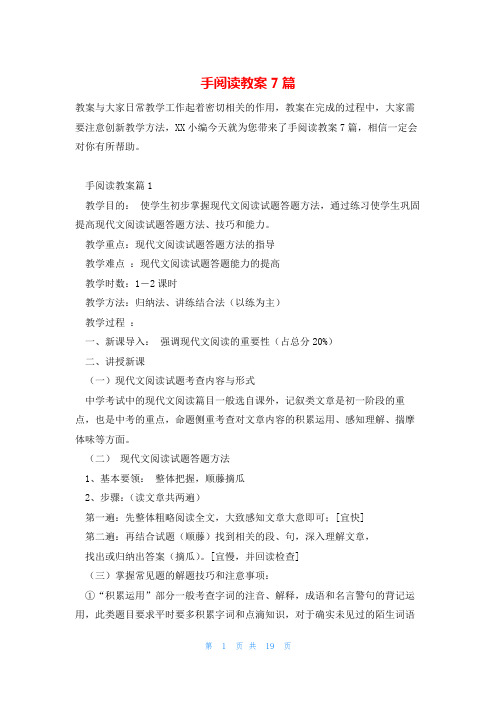
手阅读教案7篇教案与大家日常教学工作起着密切相关的作用,教案在完成的过程中,大家需要注意创新教学方法,XX小编今天就为您带来了手阅读教案7篇,相信一定会对你有所帮助。
手阅读教案篇1教学目的:使学生初步掌握现代文阅读试题答题方法,通过练习使学生巩固提高现代文阅读试题答题方法、技巧和能力。
教学重点:现代文阅读试题答题方法的指导教学难点:现代文阅读试题答题能力的提高教学时数:1―2课时教学方法:归纳法、讲练结合法(以练为主)教学过程:一、新课导入:强调现代文阅读的重要性(占总分20%)二、讲授新课(一)现代文阅读试题考查内容与形式中学考试中的现代文阅读篇目一般选自课外,记叙类文章是初一阶段的重点,也是中考的重点,命题侧重考查对文章内容的积累运用、感知理解、揣摩体味等方面。
(二)现代文阅读试题答题方法1、基本要领:整体把握,顺藤摘瓜2、步骤:(读文章共两遍)第一遍:先整体粗略阅读全文,大致感知文章大意即可;[宜快]第二遍:再结合试题(顺藤)找到相关的段、句,深入理解文章,找出或归纳出答案(摘瓜)。
[宜慢,并回读检查](三)掌握常见题的解题技巧和注意事项:①“积累运用”部分一般考查字词的注音、解释,成语和名言警句的背记运用,此类题目要求平时要多积累字词和点滴知识,对于确实未见过的陌生词语可结合语境(上下文)揣摩分析。
②问指示代词“这、那”所指内容:多从代词前面文字中找答案。
③问语句、语段的作用:(要从两方面考虑)一从结构上,常起a承上启下过渡、b总领下文或c总结上文的作用;二从内容上,常有a开篇点题,b设伏笔、c作铺垫、d深化中心、e点明主旨(画龙点睛)等作用。
④问文章、段落的结构形式:注意总分式(a总分、b分总、c总分总);层进式;并列式。
⑤问文章线索:注意那些在文中多次出现的字眼。
⑥问文段大意:找中心句,注意段首句、段尾句。
(如无中心句)归纳段意:本段(概括或具体)写了“谁――干什么”。
(或“什么――怎么样”)⑦问语句含义:要从文章主旨中心去分析,表述要准确、通顺。
Lingling is better than Daming

M6 Unit2 Lingling is better than Daming 教学设计一、教材分析:Module6 unit2的主题是“Music”,Unit2是在Unit1的基础上继续练习使用“better /worse ”进行比较,并在此基础上巩固复习动词like和情态动词can的用法,学习一些乐器的名称。
学习任务是:Lingling is better than Daming。
本课的教学对象是四年级的学生,他们对英语的学习已经有了一年的基础。
所以在知识的教学过程中,尽可能多的创造良好的语言环境,给学生提供大胆实践、积极参与的机会,并培养学生观察和总结规律的能力,是其在语言交流运用中能够做到举一反三。
三、教学目标(一)知识目标1、能听懂会说并认读单词:“erhu, zither, guitar, drums ”短语:“pop music,Chinese music ”2、能听懂会说并认读句子:Lingling is better than Daming.Amy is worse than Sam.(二)能力目标:能运用…better/…worse than …对事物进行比较。
能运用…like 表达喜爱的事物。
能运用can 表达有能力弹奏某种乐器。
(三)情感目标1、激发学生的学习欲望,培养学生的合作能力和竞争意识。
2、通过各种学习活动,培养学生敢于展示自我、乐于展示自我的能力。
四、教学重难点教学重点:能听懂、会说四种乐器的英文名称,并能用熟练的语言来比较事物的好坏。
教学难点:1、会用所学单词和句子熟练比较事物的好坏。
2、单词zither的发音。
五、教具准备多媒体课件、录音机、磁带、六、教学过程:Step1 Greetings (师生互致问候)Step2 Warming up ( 热身活动)1、Sing a song 《london bridge is falling down》(两遍)【设计理念】这个环节的设计是让孩子在轻松愉快的情景中感知英语,欢快的歌曲将孩子们引入了快乐的英语世界,唱两遍的目的是形成评价,引出better。
外研版(三起)-英语-三年级下册--Module 6 Unit 2 What does Lingling have at school- 教案
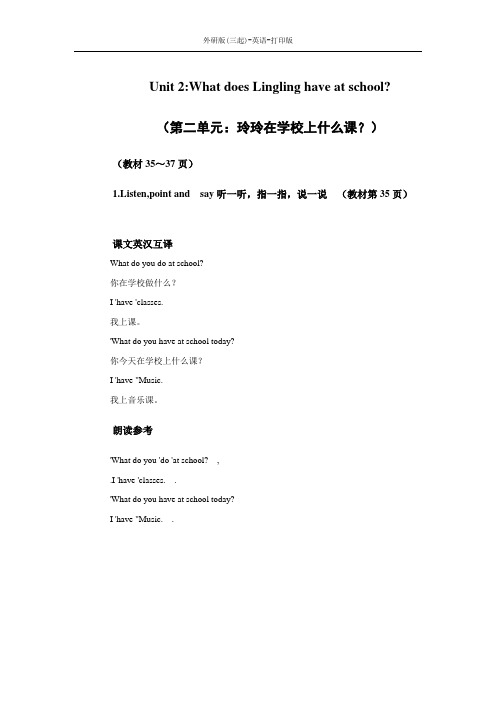
Unit 2:What does Lingling have at school?(第二单元:玲玲在学校上什么课?)(教材35~37页)1.Listen,point and say听一听,指一指,说一说(教材第35页)课文英汉互译What do you do at school?你在学校做什么?I 'have 'classes.我上课。
'What do you have at school today?你今天在学校上什么课?I 'have "Music.我上音乐课。
朗读参考'What do you 'do 'at school? ,.I 'have 'classes. .'What do you have at school today?I 'have "Music. .新词速记1.have/haev/v.(动词)上(……课),有短语:have classes上课have lunch吃午饭例句:I have Chinese,English and PE in the morning.上午我上语文、英语和体育课。
Do you have something to eat?你有什么可以吃的东西吗?拓展:have的第三人称单数形式为has2.today/t'de/adv.(副词)在今天:n(名词)今天短语:today's life今天的生活例句:They want to go to the zoo today.今天他们想去动物园。
What do you have at school today?你今天在学校上什么课?拓展:yesterday昨天,tomorrow明天3.music/‘mju:z k/n.(名词)音乐短语:listen to music听音乐music room音乐室例句:Tom likes music.汤姆喜欢音乐。
外研版英语五年级上册M1unit2

Lingling ran to the bus. And she dropped her ice cream.
Retterday
go home
when
who
a postcard
Lingling, Sam and Amy
what
where park
met
[ i:]
Look, listen and say
Did she send you an email?
No, She didn’t.
Here’s a postcard from Lingling. It’s for you.
bought
go home
when who
a postcard
what
where
yesterday Lingling, Sam and Amy
Listen and repeat
[Ι]
[e]
[æ ]
Chinese teacher
e ea [ i:]
listen give
i [Ι]
tell
e
[e]
then
cat apple
a [æ ]
Follow and say What did you do yesterday?
Yesterday I bought an ice cream. Yesterday Xiaohai bought an ice cream and I watched TV.
ice creams. Then we went home by bus. I ran to the bus.
And I dropped my ice cream on John’s shoes.
四年级英语Module 6 教学设计
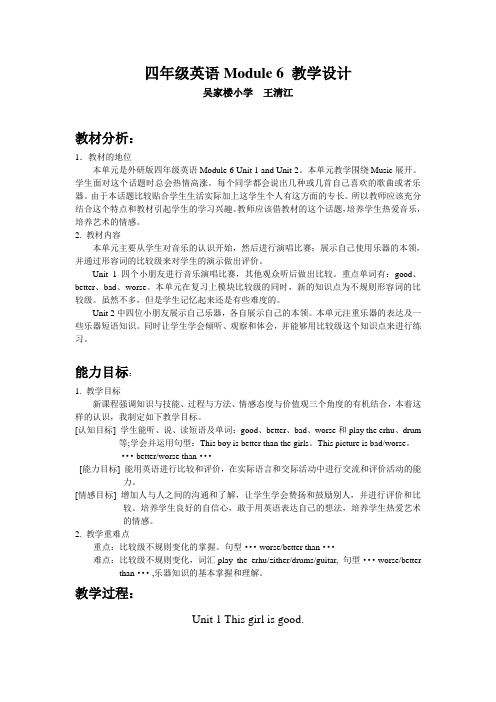
四年级英语Module 6 教学设计吴家楼小学王清江教材分析:1.教材的地位本单元是外研版四年级英语Module 6 Unit 1 and Unit 2。
本单元教学围绕Music展开。
学生面对这个话题时总会热情高涨。
每个同学都会说出几种或几首自己喜欢的歌曲或者乐器。
由于本话题比较贴合学生生活实际加上这学生个人有这方面的专长。
所以教师应该充分结合这个特点和教材引起学生的学习兴趣。
教师应该借教材的这个话题,培养学生热爱音乐,培养艺术的情感。
2. 教材内容本单元主要从学生对音乐的认识开始,然后进行演唱比赛;展示自己使用乐器的本领,并通过形容词的比较级来对学生的演示做出评价。
Unit 1 四个小朋友进行音乐演唱比赛,其他观众听后做出比较。
重点单词有:good、better、bad、worse。
本单元在复习上模块比较级的同时,新的知识点为不规则形容词的比较级。
虽然不多,但是学生记忆起来还是有些难度的。
Unit 2中四位小朋友展示自己乐器,各自展示自己的本领。
本单元注重乐器的表达及一些乐器短语知识。
同时让学生学会倾听、观察和体会,并能够用比较级这个知识点来进行练习。
能力目标:1. 教学目标新课程强调知识与技能、过程与方法、情感态度与价值观三个角度的有机结合,本着这样的认识,我制定如下教学目标。
[认知目标] 学生能听、说、读短语及单词:good、better、bad、worse和play the erhu、drum 等;学会并运用句型:This boy is better than the girls。
This picture is bad/worse。
···better/worse than···[能力目标] 能用英语进行比较和评价,在实际语言和交际活动中进行交流和评价活动的能力。
[情感目标] 增加人与人之间的沟通和了解,让学生学会赞扬和鼓励别人,并进行评价和比较。
